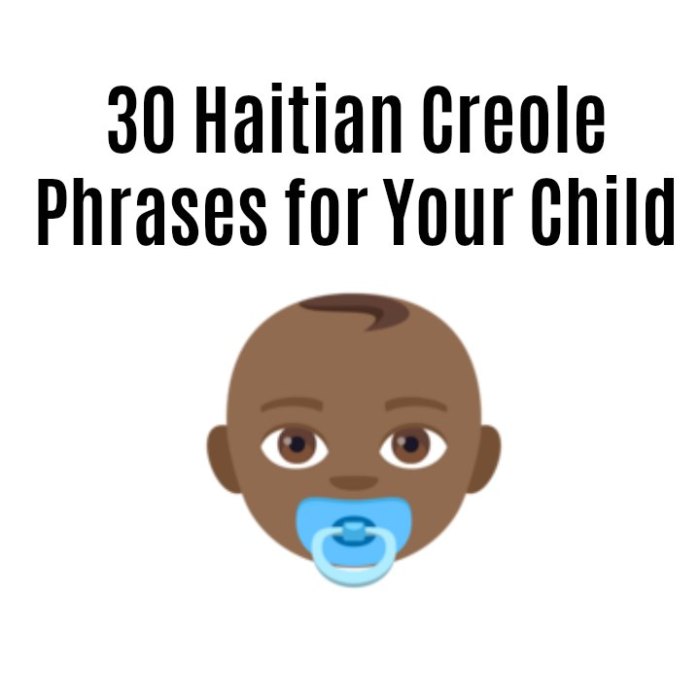Curse words in Haitian Creole, a vibrant and expressive language, offer a fascinating glimpse into the cultural and linguistic landscape of Haiti. From their historical origins to their contemporary usage, these words hold a unique significance, shaping communication and reflecting the complexities of Haitian society.
In this comprehensive exploration, we delve into the etymology, cultural significance, linguistic analysis, comparative analysis, and censorship surrounding Haitian Creole curse words. Join us as we uncover the rich tapestry of language, culture, and expression.
Etymology of Haitian Creole Curse Words

Haitian Creole curse words have a rich and complex history, reflecting the diverse influences that have shaped the language and culture of Haiti.
The origins of Haitian Creole curse words can be traced back to the 17th and 18th centuries, when French colonists brought their own curse words to the island. These words were quickly adopted by the enslaved African population, who used them to express their anger and frustration at their oppressors.
Linguistic Roots
The linguistic roots of Haitian Creole curse words are primarily French, but they also include influences from African languages such as Wolof, Fon, and Yoruba. Many of the curse words are direct translations of French curses, while others are more creative and unique to Haitian Creole.
Cultural Factors, Curse words in haitian creole
The development of Haitian Creole curse words has also been influenced by cultural factors, such as the history of slavery, the Haitian Revolution, and the country’s political and economic instability. Curse words have been used as a way to express resistance to oppression, to vent frustration, and to cope with the challenges of everyday life.
Cultural Significance of Curse Words in Haitian Creole

Haitian Creole curse words hold significant cultural weight, reflecting the language’s vibrant and expressive nature. They serve various social and cultural functions, from expressing anger and frustration to conveying humor and intimacy.
Different types of curse words carry specific nuances and meanings, reflecting the complex social and cultural context in which they are used. Some are considered mild and humorous, while others are deeply offensive and can carry serious consequences.
Expressing Anger and Frustration
Curse words in Haitian Creole are often used as a way to vent anger and frustration. They can provide a cathartic release for strong emotions, allowing individuals to express their feelings without resorting to violence or other destructive behaviors.
- “Mèsi manman ou!”(literally, “Thank your mother!”): A common expression of anger or frustration, used to insult someone’s family.
- “Chita nan je ou!”(literally, “Sit on your eyes!”): An expression of extreme frustration, used to tell someone to shut up or go away.
Linguistic Analysis of Haitian Creole Curse Words: Curse Words In Haitian Creole
Haitian Creole curse words are a fascinating and integral part of the language, offering insights into the culture and communication patterns of Haitian society. This analysis delves into the grammatical structure, syntax, common patterns, idioms, and expressions used in cursing, exploring their role in Haitian Creole vocabulary and their impact on communication.
Grammatical Structure and Syntax
Haitian Creole curse words exhibit unique grammatical features. Many curses are formed using the imperative mood, conveying a sense of urgency or command. For example, “Bouke sa!” (Break that!) expresses frustration or anger. Additionally, curses often employ the use of interjections, such as “Bay!” (Give!) or “Pran!” (Take!), to emphasize the intensity of the emotion.
Common Patterns and Idioms
Certain patterns and idioms are prevalent in Haitian Creole cursing. One common pattern involves the repetition of a single word or phrase, such as “Mèd mwen, mèd mwen!” (My mother, my mother!) to convey extreme exasperation. Idioms, such as “Li gen yon lang kokiy” (He has a rooster’s tongue) to describe someone who talks excessively, add color and imagery to the language of cursing.
Role in Haitian Creole Vocabulary
Profanity plays a significant role in Haitian Creole vocabulary, serving as a powerful tool for expressing emotions, emphasizing points, and creating a sense of camaraderie among speakers. Curse words are often used in informal settings, among friends and family, and can convey a range of emotions, from anger and frustration to humor and affection.
Impact on Communication
The use of curse words in Haitian Creole can have a profound impact on communication. While they can add emphasis and humor, their excessive use can be perceived as vulgar or disrespectful. It is important for speakers to be aware of the context and audience when using curse words, as their appropriateness can vary depending on the situation.
Comparative Analysis of Haitian Creole Curse Words with Other Languages
Haitian Creole curse words share similarities and differences with those found in other languages. Like curse words in English, they often express strong emotions such as anger, frustration, or surprise. However, they also have unique characteristics that reflect the specific cultural context of Haiti.
One of the most common ways to express anger or frustration in Haitian Creole is through curse words. These words are often very vulgar and can be quite offensive, but they are also a part of the language’s culture. In unit 8 lesson 1 joshua’s law , you’ll learn about the different types of curse words in Haitian Creole and how they are used.
You’ll also learn how to avoid using them in your own speech.
One notable similarity is the use of body parts in curse words. For example, the Haitian Creole word “malfini” (literally “bad end”) is used to refer to someone who is unlucky or incompetent. This is similar to the English curse word “asshole,” which also uses a body part to insult someone’s character.
Another similarity is the use of religious imagery in curse words. For example, the Haitian Creole word “dyab” (literally “devil”) is used to refer to someone who is evil or malicious. This is similar to the English curse word “hell,” which also uses religious imagery to express disapproval.
However, there are also some key differences between Haitian Creole curse words and those found in other languages. For example, Haitian Creole curse words often use more graphic and explicit language. The word “bouda” (literally “cunt”) is commonly used to insult women, while the word “neg” (literally “black”) is used to insult people of African descent.
These differences reflect the specific cultural context of Haiti, where there is a history of racial and sexual oppression. Haitian Creole curse words are often used to express anger and frustration at these injustices.
Implications for Cross-Cultural Communication and Language Diversity
The comparative analysis of Haitian Creole curse words with those found in other languages has implications for understanding cross-cultural communication and language diversity. It shows that curse words are not simply vulgar or offensive words, but rather they reflect the cultural values and beliefs of the people who use them.
When communicating with people from different cultures, it is important to be aware of the different meanings and connotations of curse words. Using a curse word that is considered offensive in one culture may be perfectly acceptable in another. It is also important to remember that curse words are often used to express strong emotions, and that using them in the wrong context can be hurtful or disrespectful.
The study of curse words can also help us to understand the diversity of human language. Curse words are a part of every language, and they provide a unique window into the culture of the people who speak it.
Censorship and Taboos Surrounding Haitian Creole Curse Words
Haitian Creole curse words are deeply ingrained in the culture and language, yet their usage is governed by strict social norms and taboos. In certain contexts, these words are considered highly offensive and unacceptable, while in others, they may be used for emphasis or humor.
Role of Censorship and Taboos
Haitian society has traditionally held a conservative view towards curse words, considering them disrespectful and inappropriate in polite conversation. This taboo stems from the influence of religion, particularly Christianity, which emphasizes morality and proper language. As a result, curse words are often censored in public discourse, media, and educational settings.
Impact of Social Media and Technology
The advent of social media and technology has had a significant impact on the spread and perception of Haitian Creole curse words. While these platforms have facilitated the wider dissemination of curse words, they have also led to increased awareness of their potential offensiveness.
Social media users are more likely to encounter curse words in online conversations, which can challenge traditional taboos and norms.
Helpful Answers
What is the historical origin of Haitian Creole curse words?
Haitian Creole curse words have diverse origins, including French, Spanish, African languages, and indigenous Taíno influences.
How do Haitian Creole curse words differ from those in other languages?
While sharing similarities with curse words in other languages, Haitian Creole curse words have unique cultural nuances and linguistic structures.
What are the social and cultural implications of using Haitian Creole curse words?
The use of Haitian Creole curse words can vary depending on context, reflecting social norms, taboo, and the speaker’s intent.